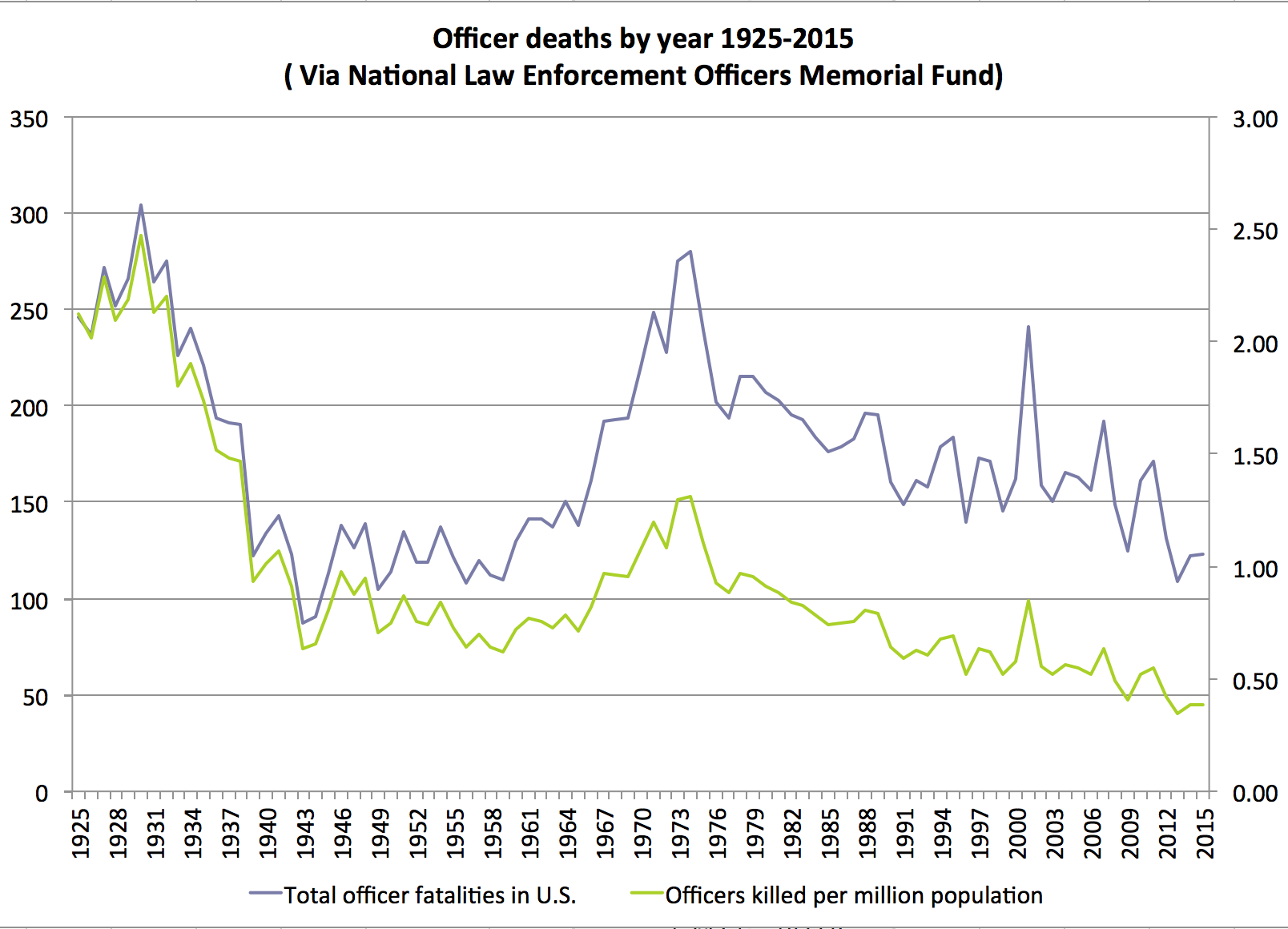Even accounting for the mass murders in Dallas, US police fatalities remain at historic lows. Sixty US officers have died on duty Jan 1 to July 14, 2016. That is exactly the number who died Jan 1-July 14, 2015. Police gunshot fatalities did increase from 18 to 28 across the nation during this period, but non-gun fatalities declined by ten, too.
It’s a tough time for police this year, no doubt. Yet the data don’t show widespread threats to officer safety compared to last year. On a per-capita basis, policing remains safer in 2016 than it has been at any point over the past ninety years.

Author: Harold Pollack
Harold Pollack is Helen Ross Professor of Social Service Administration at the University of Chicago. He has served on three expert committees of the National Academies of Science. His recent research appears in such journals as Addiction, Journal of the American Medical Association, and American Journal of Public Health. He writes regularly on HIV prevention, crime and drug policy, health reform, and disability policy for American Prospect, tnr.com, and other news outlets. His essay, "Lessons from an Emergency Room Nightmare" was selected for the collection The Best American Medical Writing, 2009. He recently participated, with zero critical acclaim, in the University of Chicago's annual Latke-Hamentaschen debate.
View all posts by Harold Pollack

It would be better to limit these to homicides rather than use all on-the-job deaths, which include heart attacks, accidents, etc. Officer Down has the data. More than 1/3 of this year's deaths were not caused by someone trying to kill a cop.
In the list of most dangerous jobs, policing is only about 15th place. About half as dangerous as being a garbage man, marginally more dangerous than gardening.
And Manny Ramirez is only the 15th best homerun hitter of all time. What's your point?
They point is, is anyone demanding we revere garbage men and landscapers for their willingness to lay their lives on the line?
Equating danger with risk of death on the job doesn't fully capture the trauma of police work. Officers routinely deal with people who are some combination of crazy, drugged out, and violent. These encounters often lead to injuries ranging from mild scrapes to broken bones. Very few of the cops I know have gone multiple years without being out on medical leave for at least some period of time.
And this is without accounting for the emotional trauma of dealing with awful situations repeatedly over the course of a career: Dead children that need to be pulled out of wrecked cars, parents that need to be informed that their kids will never come home, victims of sexual abuse. Deal with these long enough and you will have psychological scars to match the physical ones.
I think it's a far proxy, accidents and attacks exist on a continuum, there's no reason to believe non-police jobs that have higher death rates don't maim you at a higher rate, too.
When you look at the BLS statistics, I think that you will find that patrol officers and deputies have a pretty high injury rate. (You can't use all public justice employees because that includes prosecutors, defense attorneys, judges, etc.)
It should be.
Should had not happened on the first place.
Water Damage
They should or there will be anarchy.
Tag: Healthperm Resourcing | Job Careers for Filipino Nurses, Doctors, AHPs
Hope it is..
Yet the data don’t show widespread threats to officer safety compared to last year. <a href="http://www.rx2go.com” target=”_blank”>www.rx2go.com
this is very sad.
Your article is very interesting. Thank you for the information. https://bit.ly/2NVAf1B
Your article is very interesting. Thank you for the information. https://bit.ly/2NVAf1B
Great article, with a lot of good advice. Your blog is very informative. Thank you for sharing this post. Golden Triangle With Varanasi